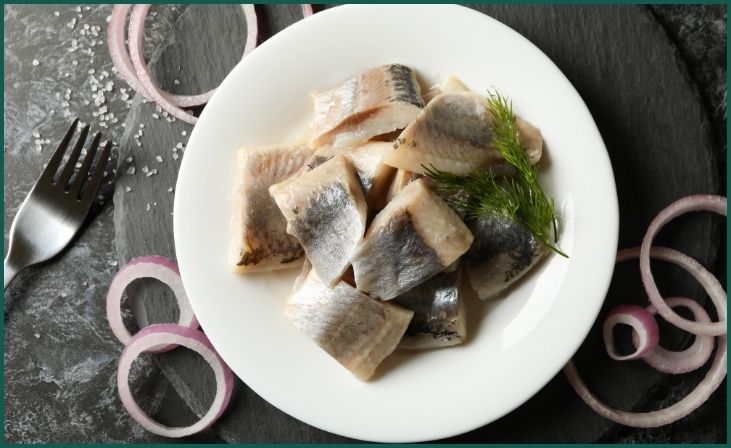The paragraph introduces the nutritional benefits of consuming fish, highlighting its richness in essential nutrients like omega-3 fatty acids, proteins, vitamins, and minerals, which contribute to heart health, brain function, and overall well-being. It acknowledges the importance of making informed choices regarding the types of fish consumed, noting variations in nutritional value and sustainability.
The blog post promises to delve into the 10 best types of fish to eat, taking into account factors such as nutritional content, sustainability, and availability. By exploring these factors, readers will gain insights into selecting fish varieties that not only offer health benefits but also align with environmental considerations. Ultimately, the post aims to empower readers to make educated choices about their seafood consumption, promoting both personal health and environmental sustainability.
Table of Contents
ToggleTypes of Fish
Salmon

Salmon earns its reputation as one of the healthiest fish options, primarily due to its abundant omega-3 fatty acids, including EPA and DHA, known for supporting heart health and cognitive function. Furthermore, salmon provides high-quality protein, along with essential nutrients like vitamins D and B12, as well as selenium, which contribute to overall well-being.
Prioritizing wild-caught salmon ensures sustainability and minimizes exposure to contaminants commonly present in farmed varieties. With its impressive nutritional profile and sustainability considerations, incorporating salmon into one’s diet offers a delicious and healthful way to support optimal health while being mindful of environmental impact.
Read Also: 8 Italian Casseroles That Would Make Your Nonna Proud
Sardines
Despite their small size, sardines pack a nutritional punch. They are rich in omega-3 fatty acids, calcium, vitamin D, and protein. Sardines are also low in mercury, making them a safe choice for regular consumption, even for pregnant women and children. Choose canned sardines packed in olive oil for added health benefits, and enjoy them on salads, crackers, or toast for a quick and nutritious meal.
Mackerel

Mackerel, characterized by its oiliness, is abundant in omega-3 fatty acids, notably EPA and DHA, essential for various bodily functions. Additionally, it boasts high levels of vitamin D, vitamin B12, and selenium, contributing to overall health and well-being. Regular consumption of mackerel can aid in reducing inflammation, enhancing brain function, and supporting cardiovascular health.
However, its elevated mercury content necessitates moderation in consumption to mitigate potential health risks, particularly for sensitive populations. Despite this caveat, incorporating mackerel into a balanced diet offers numerous health benefits, making it a valuable addition to meals for individuals seeking to optimize their nutritional intake while being mindful of mercury exposure.
Trout
Trout, a freshwater fish renowned for its subtle taste, offers a multitude of nutritional advantages. Laden with protein, omega-3 fatty acids, and vital nutrients like vitamin D and various B vitamins, trout stands as a nutritious dietary choice. Notably, trout boasts low mercury levels compared to other fish varieties, ensuring its safety for frequent consumption.
Its versatility in cooking methods—whether grilled, baked, or pan-seared—makes it a versatile and flavorful addition to any meal. By incorporating trout into your diet regularly, you can enjoy its delectable taste while reaping the numerous health benefits it provides, contributing to a well-rounded and wholesome eating regimen.
Tuna (Skipjack or Albacore)

Tuna is a popular fish enjoyed worldwide for its versatility and mild flavor. Skipjack and albacore tuna are among the best choices due to their lower mercury levels compared to other tuna species. Tuna is an excellent source of lean protein, omega-3 fatty acids, selenium, and vitamin D. However, due to concerns about overfishing and bycatch, it’s essential to choose sustainably caught tuna and consume it in moderation.
Cod
Cod is renowned for its mild taste and delicate texture, making it a sought-after choice among seafood enthusiasts. As a lean, white fish, it offers an abundance of high-quality protein while being low in fat. Additionally, cod is packed with essential vitamins such as B12 and B6, along with nutrients like phosphorus, niacin, and selenium.
Don't just scroll, subscribe!
BuzzTrail's unique web-stories are the cure for boredom you've been waiting for.
Its versatility in cooking methods—whether baked, grilled, or pan-fried—allows for a range of culinary possibilities, complemented by various seasonings and sauces. Opting for sustainably caught cod ensures not only the preservation of healthy oceans and fisheries but also the continuation of responsible seafood consumption practices, making it a wise choice for both personal health and environmental stewardship.
Herring

Herring, although often underestimated, offers a remarkable nutritional profile that merits inclusion in your diet. This small, oily fish is abundant in omega-3 fatty acids, vitamin D, vitamin B12, and selenium. Regular consumption of herring can contribute to reducing inflammation, lowering the risk of heart disease, and promoting brain health.
Whether enjoyed smoked, pickled, or grilled, herring provides a flavorful and nutritious addition to meals. Its versatility in cooking methods allows for a variety of culinary creations, making it easy to incorporate herring into your diet to reap its numerous health benefits and enjoy its delicious taste.
Anchovies
Anchovies may be small, but they boast significant flavor and nutritional value. Packed with omega-3 fatty acids, calcium, iron, and protein, these tiny fish offer a powerhouse of nutrients. Despite their intense taste, anchovies can elevate the flavor profile of a variety of dishes, from salads to pizzas and pasta sauces.
Furthermore, anchovies are low in mercury and rich in heart-healthy fats, making them a wise dietary choice for enhancing overall health and well-being. Their versatility in enhancing dishes and their nutritional benefits make anchovies a valuable addition to any diet, providing both flavor and nourishment in a compact package.
Rainbow Trout

Rainbow trout stands out as a freshwater fish admired for its vivid hues and gentle taste. Beyond its visual appeal, it offers a wealth of nutritional benefits, boasting high levels of omega-3 fatty acids, protein, and key nutrients like vitamin D and selenium. Notably, rainbow trout is low in mercury, ensuring its safety for regular consumption.
Whether prepared grilled, broiled, or baked, rainbow trout elevates any meal with its delicious and healthful qualities. Its versatility in cooking methods allows for easy incorporation into various dishes, making it a versatile and nourishing option for those seeking a flavorful yet nutritious addition to their diet.
Read Also: 5 Surprising Health Benefits of Kimchi
Mahi Mahi
Mahi Mahi, also known as dolphinfish, is revered for its firm texture and subtle taste, making it a sought-after saltwater fish. Not only is it a rich source of lean protein, but it also boasts essential nutrients such as vitamins B12 and B6, as well as minerals like selenium and phosphorus. Moreover, mahi mahi is low in mercury, making it a safe and nutritious choice for consumption.
Versatile in cooking methods, it can be grilled, baked, or pan-seared to perfection. When selecting mahi mahi, opting for sustainably caught varieties is crucial, as it supports the health of fisheries and marine ecosystems, ensuring a responsible approach to seafood consumption.
Bottom Line
Incorporating a variety of fish into your diet can provide numerous health benefits, from supporting heart health to boosting brain function. The 10 types of fish mentioned in this blog post are not only delicious but also packed with essential nutrients like omega-3 fatty acids, vitamins, and minerals. When selecting fish, prioritize sustainability and choose options that are low in mercury to maximize health benefits while minimizing environmental impact. Whether you enjoy salmon, sardines, or trout, adding fish to your weekly meals can contribute to a nutritious and well-rounded diet.
FAQs
Why is it important to eat fish?
Why is it important to eat fish?
Eating fish is important because it provides essential nutrients like omega-3 fatty acids, high-quality proteins, vitamins, and minerals that are beneficial for heart health, brain function, and overall well-being. Regular consumption of fish has been linked to reduced risk of heart disease, improved cognitive function, and better overall health.
Which types of fish are the most sustainable to eat?
Which types of fish are the most sustainable to eat?
When it comes to sustainability, it’s best to choose fish species that are abundant and harvested using methods that minimize environmental impact. Some examples of sustainable fish options include sardines, anchovies, mackerel, trout, and certain varieties of tuna like skipjack and albacore.

